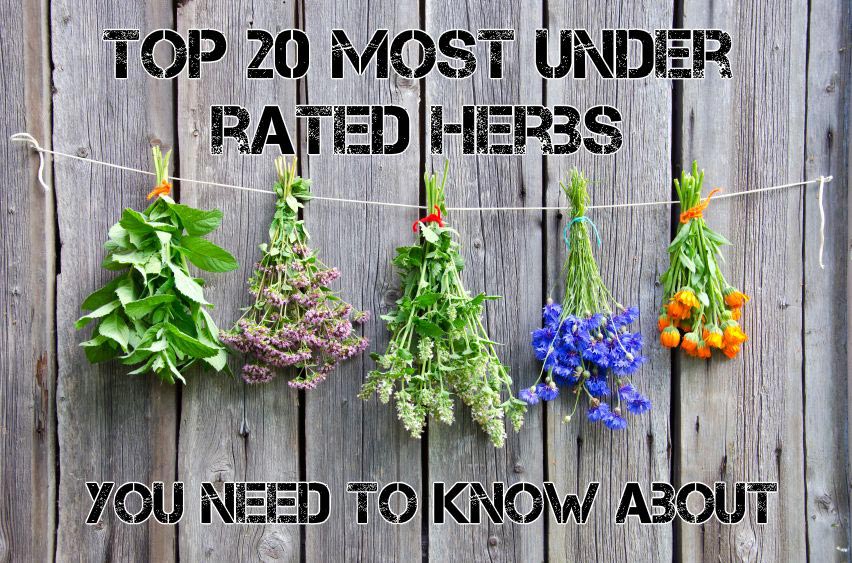
When you think of cooking, what herbs come to mind? Rosemary, Basil, Oregano, Peppermint, and Sage? Perhaps Lavender, Thyme, and Tarragon make your list as well. There is a long list of common kitchen herbs which are staples in the lives of most natural living enthusiasts.
We grow them for their medicinal properties or to use as flavoring in our favorite dishes. But there is much more to the world of herbs than just these everyday constituents. A wealth of lesser-known botanicals with incredible health benefits, interesting flavors, beautiful foliage, and intriguing aromas exist in the world, just waiting for the avid herbalist to cultivate and appreciate them.
The following are 20 of the most under-rated healing herbs which might just feel right at home in your garden. All of the herbs mentioned in this list can be purchased from this page on Mountain Rose Herbs. Alternatively, we provide individual links to find these herbs on Amazon.
1. Agrimony
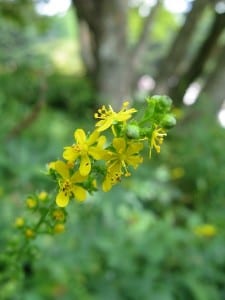 Agrimony, or Agrimonia are a genus of over a dozen species of herb in the Rosaceae family (alongside such favorites as the rose, apple tree, almond, and strawberry.) This herb has been historically revered as a natural remedy for ailments of the eyes, even owing its name to the Greek word Argemone, meaning ‘plant that heals the eye.’ Agrimony has also been used for such things as healing of wounds and other skin conditions, treatment of cough and sore throat, to ease gastrointestinal discomfort, and as a sleep aid.
Agrimony, or Agrimonia are a genus of over a dozen species of herb in the Rosaceae family (alongside such favorites as the rose, apple tree, almond, and strawberry.) This herb has been historically revered as a natural remedy for ailments of the eyes, even owing its name to the Greek word Argemone, meaning ‘plant that heals the eye.’ Agrimony has also been used for such things as healing of wounds and other skin conditions, treatment of cough and sore throat, to ease gastrointestinal discomfort, and as a sleep aid.
Agrimony is best enjoyed as a tea. You can grow your own or try this Organic Dried Agrimony from Niyama Herbal Arts.
2. Alfalfa
Alfalfa (Medicago sativa) is commonly used as livestock fodder due to its high protein content and rich mineral content, but the herb has many benefits to offer human as well. Alfalfa is excellent for treatment of severe nausea such as that caused by morning sickness. Its also an effective natural remedy for ailments of the urinary tract such as kidney stones and urinary tract infections. Alfalfa is excellent for flushing toxins from the liver and gastrointestinal tracts. It is also known to help lower cholesterol. Finally, alfalfa may help to speed up physical recovery after an illness due to its high concentration of nutrients.
Grow your own alfalfa from seed. Alternately, you can purchase sprouts or dried leaves to enjoy all of the herbs incredible health benefits.
3. Aniseed
Aniseed (Pimpinella anisum) is similar in flavor to star anise, fennel, and liquorice. The herb is incredibly effective for improving digestion, reducing flatulence, and easing nausea. Aniseed is also known to increase milk supply in breastfeeding women. It may be used to quell anxiety, as well as to ease cold symptoms like cough, congestion, and sore throat.
Grow this lovely flowering herb in your garden or you can purchase Organic Aniseed Powder from this page on Amazon.com.
4. Cardamom
Cardamom are a group of several species of flowering plants in the ginger family, Zingiberaceae. As an herbal remedy, cardamom helps to protect the gastrointestinal tract, cleanse the blood of bad cholesterol, improve circulation, and even prevent the development some forms of cancer. Cardamom is antimicrobial, making it effective against periodontal disease and urinary tract infections. The herb is a natural anti-depressant, anti-inflammatory, and anti-spasmodic. Cardamom is also known to improve the health and function of the male sexual organs.
Aside from its many health benefits, cardamom also has an incredible floral aroma and taste which have earned it the title “Queen of Spices” throughout much of Asia.
Cardamom is a tropical plant and can be difficult to grow. Still, experienced or adventurous gardeners may want to give it a go. You can buy cardamom seeds here and they are relatively inexpensive. Or purchase this Organic Cardamom Powder to experience the amazing flavor and health benefits of this wonderful herb.
5. Catmint
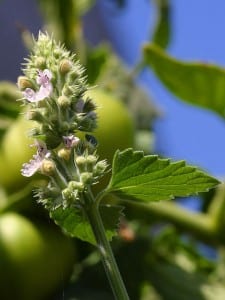 A close relative of peppermint, spearmint, and lemon balm, Catmint (Nepeta cataria, also commonly known as catnip) is best known for the stimulating effect which the herb has on felines. However, this “cat cannabis” has more to offer to us humans than it does to felines. Catmint tea can help to relieve cold symptoms like sore throat, sinus pressure, and headache. It is also effective for reduction of fever, as the herb induces sweating. Drink catmint tea as a digestive aid to help to calm gastrointestinal upset, reduce flatulence, and ease stomach aches. Catnip may also be applied to wounds to help stop bleeding or reduce swelling.
A close relative of peppermint, spearmint, and lemon balm, Catmint (Nepeta cataria, also commonly known as catnip) is best known for the stimulating effect which the herb has on felines. However, this “cat cannabis” has more to offer to us humans than it does to felines. Catmint tea can help to relieve cold symptoms like sore throat, sinus pressure, and headache. It is also effective for reduction of fever, as the herb induces sweating. Drink catmint tea as a digestive aid to help to calm gastrointestinal upset, reduce flatulence, and ease stomach aches. Catnip may also be applied to wounds to help stop bleeding or reduce swelling.
Catmint is super easy to grow (as with most mints) from seed and produces beautiful purple flowers in the spring which will attract pollinating insects like bees and butterflies to your garden. You can also order Dried Organic Catmint on Amazon.com.
6. Sweet Cicely
Sweet Cicely (Myrrhis odorata) – also known as Garden Myrrh or Spanish Chervil – is edible from roots to flowers with a flavor much like anise and liquorice. Cicely may be used as a natural low-glycemic sweetener and the seeds are sweet enough to be enjoyed by themselves as an incredibly health dessert or treat, but that alone wouldn’t be enough to add the herb to our list. Sweet cicely can also be used to treat hypertension and anxiety, ease coughing, calm the stomach, and detoxify the urinary tract.
As if all of that weren’t enough, sweet cicely is another herb that’s easy to grow from seed (though it doesn’t do well in pots.) The plant is a hardy perennial in zones 3 – 7 and mature plants spread quickly, so you’ll have plenty of the herb to share with friends and family.
7. Red Clover
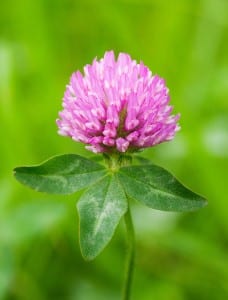 Red Clover (Trifolium pratense) is one of the most popular and well-known among the 245 known species in the genus. While some consider this delightful little flower to be a weed and others use it only as fodder for livestock, red clover is also an extremely useful herb. Red clover blossom tea makes an effective herbal remedy for cold symptoms like cough and congestion. Red clover is also great for detoxifying the body and the blood.
Red Clover (Trifolium pratense) is one of the most popular and well-known among the 245 known species in the genus. While some consider this delightful little flower to be a weed and others use it only as fodder for livestock, red clover is also an extremely useful herb. Red clover blossom tea makes an effective herbal remedy for cold symptoms like cough and congestion. Red clover is also great for detoxifying the body and the blood.
Order Trifolium pratense seeds and sow your own or try these Organic Red Clover Blossoms.
8. Coriander
The name Coriander is often used to refer only to the seeds of the popular herb Coriandrum sativum; however in this case, we’re interested in the entire plant. Coriander seeds are known to stimulate the pancreas to produce insulin which results in more balanced blood-sugar. Coriander seeds have a similar effect on blood-lipid levels, aiding the liver in balancing and improving overall cholesterol levels. Coriander seeds are also naturally antibiotic against some food-borne pathogens – salmonella being one of them.
Coriander leaves – commonly known as Cilantro – are full of fiber and nutrients, most notably vitamins A and K. Cilantro is also high in anti-oxidants and minerals such as potassium, iron, and magnesium. Not bad for a tasty little herb!
Grow your own Coriandrum sativum this spring to enjoy the benefits of both seeds and fresh leaves. Alternately, you can purchase Organic Coriander Seeds and Organic Dried Cilantro from Amazon.com.
9. Feverfew
Feverfew (Tanacetum parthenium) has a name that practically stands up and says, “Hi there! I’m medicinal.” While the herb has a long history of use around the world and its health benefits are extremely well-documented, most people have never heard of it. Feverfew is a powerful anti-inflammatory, able to reduce pain and swelling associated with arthritis, rheumatoid arthritis, and headaches. Feverfew is one of only a small handful of effective natural remedies for migraine headaches. The herb is also useful for reducing general pain and body aches, as well as for calming tension and anxiety.
You can purchase Tanacetum parthenium seeds here if you would like to grow your own. Feverfew is also available as a loose dried herb, herbal tea, and as a supplement.
10. Greenthread
Also called Navajo Tea, Plains Tea, or Coyote Plant; Greenthread are any of the flowering herbs of the genus Thelesperma (in the Asteraceae family.) This lovely daisy-like herb is a potent diuretic, as well as an anti-inflammatory which has been used by Native Americans for hundreds of years as a detoxifying herbal tea. Greenthread is still one of the best natural remedies for infections of the urinary tract and for soothing gastrointestinal distress.
Greenthread grows very easily from seed. You can also purchase Greenthread Herbal Tea on Amazon.com.
11. Hyssop
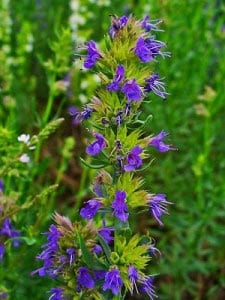 One of the oldest known medicinal herbs, Hyssop (Hyssopus officinalis) is closely related to marjoram and oregano. Much like its herbal cousins, Hyssop is a potent anti-microbial herb, great for cleansing the body of harmful bacteria such as those which cause respiratory infections and skin conditions like acne. Hyssop may also be used to combat strep, influenza, and many fungal infections.
One of the oldest known medicinal herbs, Hyssop (Hyssopus officinalis) is closely related to marjoram and oregano. Much like its herbal cousins, Hyssop is a potent anti-microbial herb, great for cleansing the body of harmful bacteria such as those which cause respiratory infections and skin conditions like acne. Hyssop may also be used to combat strep, influenza, and many fungal infections.
Grow your own Hyssop and enjoy not only the herbs health benefits, but also its gorgeous purple blossoms. You can also find Hyssop in dried loose form and as an herbal supplement.
12. Lovage
A member of the carrot family, Lovage (Levisticum officinale) is actually the sole species of its own genus. This herb has a wonderful flavor somewhere between celery, aniseed, and lemon, making it a joy to cook with. Additionally, lovage is a digestive aid which can help to reduce flatulence, sooth indigestion, as well as to cleanse the gastrointestinal and urinary tracts. Lovage is known for its ability to soothe a sore throat and ease the pain of stomach ulcers. Adding lovage to your bath may help to reduce pain and discomfort from inflammatory skin conditions.
With its thick dark foliage and Lovage makes a lush and beautiful addition to any garden. Purchase lovage seeds and grow your own. You can also drink Lovage Root Tea to enjoy the health benefits of this wonderful herb.
13. Marigold
 Marigolds (Calendula officinalis) are intensely popular as ornamental flowering plants, but they’re also extremely useful herbs! Marigold is one of the more effective herbal remedies for many inflammatory skin conditions like acne, eczema, and allergic rashes. The herb may be used to safely and naturally lower fevers, reduce swelling of joints or other damaged tissue, ease headaches, and block histamines which cause allergy symptoms. Marigold is also known to improve circulation and possibly to prevent the development of tumors. Many people also use an herbal hair rinse made from Calendula flowers to naturally cover premature greying and nourish the scalp.
Marigolds (Calendula officinalis) are intensely popular as ornamental flowering plants, but they’re also extremely useful herbs! Marigold is one of the more effective herbal remedies for many inflammatory skin conditions like acne, eczema, and allergic rashes. The herb may be used to safely and naturally lower fevers, reduce swelling of joints or other damaged tissue, ease headaches, and block histamines which cause allergy symptoms. Marigold is also known to improve circulation and possibly to prevent the development of tumors. Many people also use an herbal hair rinse made from Calendula flowers to naturally cover premature greying and nourish the scalp.
You can purchase marigold seeds and grow your own or try these dried Organic Calendula Flowers from Starwest Botanicals.
(Further reading: 6 Home Remedies To Combat Grey Hair)
14. Sweet Marjoram
While closely related to Oregano, Sweet Marjoram (Origanum majorana) has it’s own set of unique health benefits. Delicious and delicate sweet marjoram is the perfect complement to vegetable dishes and soups, as well as pork and chicken. It is also a powerfully anti-microbial herb and digestive aid. As with many other leafy green herbs, sweet marjoram is packed with nutrients and anti-oxidants like vitamins A, C, and K, iron, potassium, calcium, zinc, magnesium and manganese.
Sweet marjoram is very easy to grow from seed. You can also purchase dried Organic Sweet Marjoram from Amazon.com.
15. Parsley
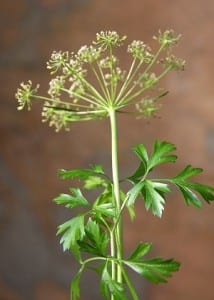 Parsley (Petroselinum crispum) may seem rather common to be found on our list, however this is one seriously under-rated herb. Parsley is so incredibly healthy that using it as nothing more than a pretty garnish then tossing it in the trash bin afterward is almost criminal! Parsley is one of the riches sources of vitamin K which is great for improving skin health and promotes faster healing of skin ailments. Parsley is also an excellent source of vitamin C and iron which strengthen the immune and circulatory systems. Parsley is powerfully antioxidant, helps to detoxify all of the body’s systems, and improves digestion and nutrient absorption.
Parsley (Petroselinum crispum) may seem rather common to be found on our list, however this is one seriously under-rated herb. Parsley is so incredibly healthy that using it as nothing more than a pretty garnish then tossing it in the trash bin afterward is almost criminal! Parsley is one of the riches sources of vitamin K which is great for improving skin health and promotes faster healing of skin ailments. Parsley is also an excellent source of vitamin C and iron which strengthen the immune and circulatory systems. Parsley is powerfully antioxidant, helps to detoxify all of the body’s systems, and improves digestion and nutrient absorption.
As if all of that weren’t enough, parsley makes you smell good. While it is fairly common knowledge that eating parsley after a meal freshens the breath; less well-known is that consuming this herb on a regular basis actually causes the body to produce a cleaner and more alluring natural scent.
Growing parsley is easy and it’s also the best way to attract the beautiful Swallowtail butterfly to your garden! Purchase these Organic Parsley Seeds from Seeds of Change on Amazon.com or try this Certified Organic Parsley by Frontier Natural Products.
16. Stevia
Stevia (Stevia rebaudiana) is becoming more and more well-known as a calorie-free sweetener. However, few people are aware of the many health benefits of this amazing plant. In South America where Stevia redaudiana originates, the herb is not only used to sweeten food, but also as a treatment for burns, indigestion, and colic. Research on the herb has shown that Stevia may be an effective natural remedy for hypertension and may actually lower blood sugar when eaten as a sugar substitute.
While Stevia rebaudiana is a tropical plant and not particularly easy to grow, seeds are available to order here for the avid herbalist. Powdered Stevia is also available from most health food stores or you can order it here.
(Further reading: 10 Reasons Why You Should Give Up Sugar Right Now!)
17. Tansy
While Tansy (Tanacetum vulgare) is considered an invasive weed in many parts of the world, when grown in in a controlled environment this pretty flowering herb makes a useful addition to the garden as live Tansy is a powerful organic repellant against pests like potato beetles, flies, ants, and mosquitoes. On a similar note, rubbing fresh tansy leaves on the skin is a more effective at repelling stinging and biting insects than most chemical bug sprays! The herb is also useful for eliminating parasitic worms, though Tansy may be toxic in large enough quantities.
Grow your own Tanacetum vulgare either in pots or direct-sown into the garden with these quality seeds from Outsidepride.
(Further reading: 6 Fragrant Herbs That Repel Flies)
18. Sweet Violet
Sweet Violet (Viola odorata) is another herb which is better-known as an ornamental flowering plant, but these pretty purple flowers aren’t just for show. Sweet violet may be brewed into a syrup which is one of the best natural remedies for cold and flu symptoms. Sweet violet tea is also a powerful pain reliever for headaches, muscle soreness, and other body aches. It can be used as a relaxant and sleep aid. The herb also has a diuretic effect to help detoxify the body.
Finally, the beautiful flowers of the sweet violet plant may be sprinkled onto salads to add interest and a sweet aroma.
Grow your own sweet violet with these seeds from Nuts n’ Cones and enjoy both the beauty and medicinal value of this lovely herb. You can also purchase dried Viola odorata here.
Also, be sure to check out this great recipe for Violet Leaf & Honey Cough Syrup, compliments of The Nerdy Farm Wife.
19. Winter Savory
Winter Savory (Satureja montana) is not only edible and quite tasty, the herb is also effective for reducing pain and irritation from bug bites and bee stings. In fact, winter savory is one of the best herbs for the job as it is also antiseptic and will help to ward off infection of these and other wounds. Drink winter savory tea to help soothe a sore throat. The herb is also useful for easing upset stomach and indigestion, reducing flatulence, and as a remedy for diarrhea.
You can purchase Satureja montana seeds and grow this beautiful flowering herb in your garden or buy dried Organic Winter Savory here.
20. Yarrow
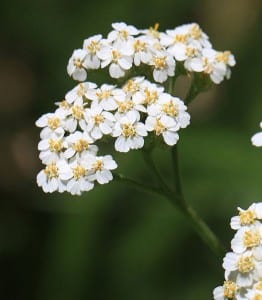 Yarrow (Achillea millefolium) is an ancient herbal remedy, its first recorded use dating back to Greece around 1000 BC. It is also one of the best herbs for boosting the immune system before and during cold and flu season. It is also great for soothing symptoms if you already have a cold. Yarrow is antiseptic, anti-inflammatory, and astringent. Drinking a tea made from the herb can aid digestion and soothe an upset stomach. The essential oil of Achillea millefolium may be applied to skin conditions like eczema to reduce pain, itching, and swelling. Add yarrow to boiling water and inhale the steam or enjoy a cup of yarrow tea to clear up congestion and help control coughing.
Yarrow (Achillea millefolium) is an ancient herbal remedy, its first recorded use dating back to Greece around 1000 BC. It is also one of the best herbs for boosting the immune system before and during cold and flu season. It is also great for soothing symptoms if you already have a cold. Yarrow is antiseptic, anti-inflammatory, and astringent. Drinking a tea made from the herb can aid digestion and soothe an upset stomach. The essential oil of Achillea millefolium may be applied to skin conditions like eczema to reduce pain, itching, and swelling. Add yarrow to boiling water and inhale the steam or enjoy a cup of yarrow tea to clear up congestion and help control coughing.
Grow your own yarrow from seed or try out this dried Certified Organic Yarrow to reap all of the benefits of this incredible under-rated herb!
***The information contained in this post is for informational purposes only and is not intended to be used as or to replace professional medical advice.*** Always consult with a licensed medical practitioner before using any herbal supplements as side-effects and drug interactions are common with many herbs. Pregnant or nursing women should always consult with their OBGYN or other attending physician before using herbs as most plants are toxic and potentially dangerous to fetuses and infants. Never give herbal supplements to children without first consulting a pediatrician.
